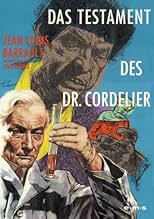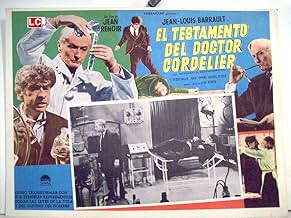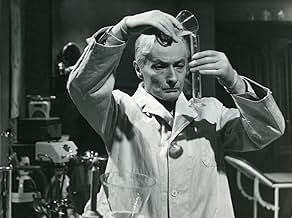IMDb रेटिंग
6.5/10
1.4 हज़ार
आपकी रेटिंग
अपनी भाषा में प्लॉट जोड़ेंMr. Joly, doctor Cordelier's lawyer, is amazed to discover that his client and friend leaves his possessions to a stranger, Opale, a sadistic criminal. He needs this man to prove that people... सभी पढ़ेंMr. Joly, doctor Cordelier's lawyer, is amazed to discover that his client and friend leaves his possessions to a stranger, Opale, a sadistic criminal. He needs this man to prove that people's behavior can be adjusted at will...Mr. Joly, doctor Cordelier's lawyer, is amazed to discover that his client and friend leaves his possessions to a stranger, Opale, a sadistic criminal. He needs this man to prove that people's behavior can be adjusted at will...
- निर्देशक
- लेखक
- स्टार
फ़ीचर्ड समीक्षाएं
This is a rather unusual but successful take on the famous Dr. Jekyll and Mr. Hyde story, written by Robert Louis Stevenson, that was first published in 1886.
In this French take on the story the story and settings are changed to the more 'modern' France of the '50's. But don't worry, they didn't changed the main character much, only his name. As a matter of fact Opal is perhaps far more brutal and a bad guy than his predecessors from earlier Dr. Jekyll and Mr. Hyde movies.
The movie is more of a thriller and mystery movie than an horror. In that regard "Le Testament du Docteur Cordelier" already works as a surprising and effective movie. It provides the movie with some nice twists (especially obviously when you aren't yet familiar with the story of Jekyll & Hyde) and original moments. Yet the movie never truly manges to captivate the viewer with its story. It's too lacking in suspense for that.
Still "Le Testament du Docteur Cordelier" remains a far better than average movie. This is mainly due to its fine visual style which suits the movie well and the professional directing from acclaimed French movie-maker Jean Renoir.
Jean-Louis Barrault gives a fine performance as Dr. Cordelier/Opale, although he plays Opale a bit too much like a drunk. It doesn't however makes his performance any less powerful- or believable. Most of the other actors also give a fine performance, although however some of them are really below par.
Still all in all "Le Testament du Docteur Cordelier" remains a good and surprising enough movie to satisfy its viewers. Far from the best Dr. Jekyll and Mr. Hyde movie but a more than good and above all, original attempt, from Jean Renoir, nevertheless.
7/10
http://bobafett1138.blogspot.com/
In this French take on the story the story and settings are changed to the more 'modern' France of the '50's. But don't worry, they didn't changed the main character much, only his name. As a matter of fact Opal is perhaps far more brutal and a bad guy than his predecessors from earlier Dr. Jekyll and Mr. Hyde movies.
The movie is more of a thriller and mystery movie than an horror. In that regard "Le Testament du Docteur Cordelier" already works as a surprising and effective movie. It provides the movie with some nice twists (especially obviously when you aren't yet familiar with the story of Jekyll & Hyde) and original moments. Yet the movie never truly manges to captivate the viewer with its story. It's too lacking in suspense for that.
Still "Le Testament du Docteur Cordelier" remains a far better than average movie. This is mainly due to its fine visual style which suits the movie well and the professional directing from acclaimed French movie-maker Jean Renoir.
Jean-Louis Barrault gives a fine performance as Dr. Cordelier/Opale, although he plays Opale a bit too much like a drunk. It doesn't however makes his performance any less powerful- or believable. Most of the other actors also give a fine performance, although however some of them are really below par.
Still all in all "Le Testament du Docteur Cordelier" remains a good and surprising enough movie to satisfy its viewers. Far from the best Dr. Jekyll and Mr. Hyde movie but a more than good and above all, original attempt, from Jean Renoir, nevertheless.
7/10
http://bobafett1138.blogspot.com/
I can see what everyone who enjoyed the movie sees in the film. There are quite a lot of good intentions in this one. Still the execution (I guess because it was made for TV) is not up to other Renoir movies. It also has dated quite badly. On the other hand, I watched the dubbed version, so I can only criticize the voices that were used, but I can also say that the body acting wasn't up to any good.
It's a shame that this didn't work for me, as it did for some people here, because I love quite a few Renoir movies and I was looking forward to this one. Yes there is a twist to the story, but I actually don't think it is that big a deal. Just because other movies who have adapted this, haven't gone that route (if you wanna know what this is based on, read the other reviews, many do write about it, I don't want to spoil it, in case you wanna watch the movie).
It's a shame that this didn't work for me, as it did for some people here, because I love quite a few Renoir movies and I was looking forward to this one. Yes there is a twist to the story, but I actually don't think it is that big a deal. Just because other movies who have adapted this, haven't gone that route (if you wanna know what this is based on, read the other reviews, many do write about it, I don't want to spoil it, in case you wanna watch the movie).
GPeoples-2 Made a comment about the lead actor's "rudimentary's make-up". The fact is Barrualt used no make-up, or camera tricks in his transformation. Barrualt was one of the most respected mime artists ever to live, displaying his talents in "Les Enfants du Paradise", and this brilliant film. His transformation is absolutely brilliant, and quite shocking to watch. Jean Renoir was one of the best directors who ever lived, and the fact that he made this brilliant made for TV film so late in his career, 1959, is a testament to his talents as a director and storyteller.
If you can get a hold of this film I don't think you'll be disappointed.
If you can get a hold of this film I don't think you'll be disappointed.
There is a quasi-prologue to introduce Cordelier, which goes a long way to connecting this TV-based production with other self-reflexive films Renoir made late in his career. Space is not explored or constructed in the same was as films like M. Lange or Regle while a lack of mobile framing maintains psychological identification with the characters. There is deep space, but not deep staging as the camera frames long corridors and archways but not groups of characters within the settings. There are situations where groups of townspeople move around together but it is a group held together tenuously and usually motivated by reactions to an event. The women in the building knew of Opale but found no reason to report his odd behavior underscoring that the milieu is very different from that of Lange, Illusion, Fonds or Regle. Some of the performances suffer from affectation which tends to diminish the impact of the Barrault roles. Dr. Cordelier has a moment while reading the newspaper where the audience is privy to an internal monologue - heightening the psychological dimensions of the narrative. There is some splattering of the famous Renoir stylistics when the doctor's party is thrown and later when the collective of workers attempt to stop Opale. Yet, soon after a flashback sequence puts things right back into the realm of the psychological (theatrical) as opposed to the social (realist). The themes of sexual perversion are somewhat muted (or perhaps they require a more 'European eye' to appreciate). The freedom that Cordelier experiences through subscribing to chaos has interesting political implications. In some manner, I feel that Cordelier is one of Renoir's more clearly political films. The narrative frame returns Renoir to the screen and the storyworld diegetic. The compulsion of the nature of humanity (quest of soul will be punished but will be freedom) echoes the true significance of a film like Regle - these films are connected philosophically, if not also thematically. Cordelier is well worth watching for the dynamic combination of Renoir and Barrault using the multiple camera shooting system. There is an even flow to the storytelling that renders the text engaging.
When the lawyer Joly (Teddy Bilis) receives the testament of his friend and psychiatrist Dr. Cordelier (Jean-Louis Barrault), Joly realizes that he is giving all his fortune and assets to his unknown patient Opale. When Joly learns that Opale is an evil man, he believes his friend is being threatened or blackmailed by Opale. Soon Opale murders a man on the street and the psychiatrist Dr. Lucien Séverin (Michel Vitold), who has a beef with Dr. Cordelier due to his experiments. After a party at Dr. Cordelier's house, his butler Désiré (Jean Topart) summons Joly since Dr. Cordelier has locked himself in the laboratory and now he is screaming in pain. Joly and Dr. Cordelier's employees break in the laboratory and find Opale inside. He asks to everyone but Joly to leave the laboratory and gives a tape to the lawyer to learn what happened with Dr. Cordelier.
"Le testament du Docteur Cordelier" is a film by Jean Renoir that retells the same story of "Strange Case of Dr Jekyll and Mr Hyde" (1886), by Robert Louis Stevenson, but set in Paris in the 50's. Maybe in 1959 it was a good movie for television, but today is a predictable rip-off of the famous novel. My vote is six.
Title (Brazil): "O Testamento do Dr. Cordelier" ('The Testament of Dr. Cordelier")
"Le testament du Docteur Cordelier" is a film by Jean Renoir that retells the same story of "Strange Case of Dr Jekyll and Mr Hyde" (1886), by Robert Louis Stevenson, but set in Paris in the 50's. Maybe in 1959 it was a good movie for television, but today is a predictable rip-off of the famous novel. My vote is six.
Title (Brazil): "O Testamento do Dr. Cordelier" ('The Testament of Dr. Cordelier")
क्या आपको पता है
- ट्रिवियाThis TV program later had a theatrical release.
टॉप पसंद
रेटिंग देने के लिए साइन-इन करें और वैयक्तिकृत सुझावों के लिए वॉचलिस्ट करें
विवरण
बॉक्स ऑफ़िस
- बजट
- FRF 6,00,00,000(अनुमानित)
- चलने की अवधि1 घंटा 35 मिनट
- रंग
- ध्वनि मिश्रण
- पक्ष अनुपात
- 1.33 : 1
इस पेज में योगदान दें
किसी बदलाव का सुझाव दें या अनुपलब्ध कॉन्टेंट जोड़ें

टॉप गैप
By what name was Le testament du Docteur Cordelier (1959) officially released in Canada in English?
जवाब























